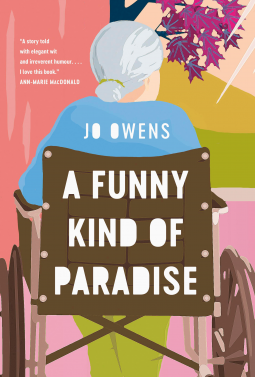4.5 Stars
I loved this novel!
Francesca Jensen
(Frannie) is a resident in an extended care facility in Victoria, B.C. A massive stroke has left her mute, partially
paralyzed, and tube-fed. She is totally
reliant on the staff for her care. She
spends her days watching and listening to the four other women who share her
room and the rotating crew of care aides.
She also reflects on her life as a single mother raising two children
(Chris and Angelina) while managing her own accounting business.
Though she cannot speak, Frannie is the narrator of this epistolary novel. She imagines she is writing to her best friend Anna who died three years earlier, and it is this letter that provides the narrative structure. Though Frannie has physical limitations, she has not suffered cognitive impairment as is witnessed in her astute observations. She comments on what she sees and hears and on her own thoughts and emotions.
Frannie is a dynamic character. She has been in the facility for a year and she admits that she spent much of that year “so angry I couldn’t even think. But now, a year later, I’m ready to come out of the dunce’s corner, like some sullen, grubby, pig-tailed schoolgirl, one knee-high crumpled to the ankle, temper under control but still holding a grudge.” Since she has so much time for reflection, she thinks back and realizes she was not the best mother. She worked hard to provide for her children but she was impatient and emotionally distant. She admits she was “fussy, impatient, bossy and opinionated.” She realizes that “my work defined me. I wasn’t particularly friendly with my clients, but I liked the person I was with them – a professional. I was confident, reliable, dependable and trustworthy.” This attitude carried over into her parenting style, which she now regrets; she wishes she had been more flexible, had listened more, and had just been nicer to people.
Her change is convincing. Having so many physical limitations, she has nothing to do but listen and think whereas in the past she never stopped to really do either. In many ways, the aides model behaviour for her. As Frannie comes into contact with the various aides, she comes to appreciate those who are gentle, compassionate, and take what little time they have to do the extras: “I think of the loving care I’m given and the respect I’m almost always treated with, and I’m thankful for the pure, sweet luck that brought me here.” She comes to realize that she did not always treat people, even her children, the way the aides now treat her.
The various aides emerge as distinct characters with distinct personalities. Some are more skilled and more compassionate than others, but Frannie comes to accept them despite their flaws because she realizes they too have lives which are not always easy. One of the regular aides is Blaire, and initially, Frannie thinks of her as unfriendly, disengaged, hard, and tough but learns that Blaire has worries of her own; at the end, Frannie comments, “when Blaire is not my nurse, she pretends that I don’t exist. It’s not personal. She treats all of us that way. . . . But that’s okay. That’s just Blaire.” It’s ironic that the aide Frannie likes the least is the one who most resembles her younger self.
The author has worked as a care aide for over 20 years so it is not surprising that her portrayal of life in an extended care facility is so realistic. She shows the everyday struggles of the aides but does not suggest that they are all perfect. During the Covid-19 pandemic where there have been so many deaths in long term care homes, this book sheds a light on the lives of front-line workers in those homes. I saw the wonderful work of these people firsthand when my father was in such a facility and when my mother was supported on her journey from this life.
The novel has an uplifting message. One is that “you’re never too old to change.” Another message is that every life is important; one of the residents, a care receiver, is told, “’You don’t know how you’re going to affect another person, even now. You just don’t know. Something you say, some part you play may completely change someone’s life, maybe my life. Maybe your own life. You just have to trust that your life is still significant.’” Certainly, Frannie’s fellow care receivers and their care givers do impact Frannie’s life in ways they will never know and never suspect.
This is a novel which will affect readers both emotionally and intellectually. And the music list at the end of the book is perfect.
Note: I received a digital galley from the publisher via NetGalley.

No comments:
Post a Comment